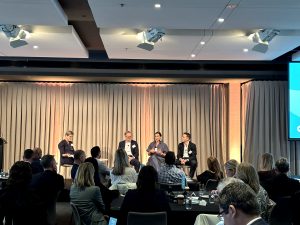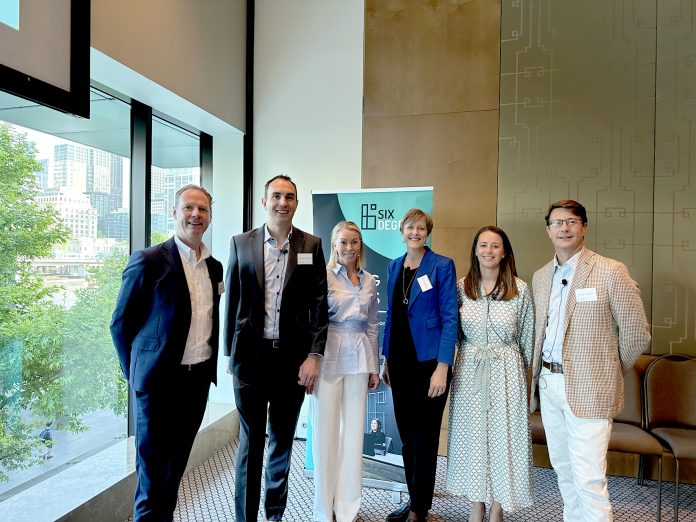Six Degrees Executive recently hosted two Food & Grocery Industry Outlook events in Melbourne and Sydney, drawing over 200 of Australia’s leading food and grocery professionals focusing on collaboration and resilience.
Australian Food and Grocery Council CEO Tanya Barden was joined by Bega Group CEO Peter Findlay, SunRice Head of Global Sales Peter Schulte, and Simplot Senior Director of Supply Chain & Fulfilment Suzanne Harman in Melbourne, while Sydney panellists included George Weston Foods CEO Paul Foster, Pepsico General Manager of Foods Alexia Horley, and Kellanova Supply Chain Director Glen Wojcinski.
With macroeconomic pressures such as inflation and supply chain challenges dominating the agenda, the industry experts discussed how suppliers are taking a balanced approach to maintain strong retailer relationships and foster long-term resilience in the face of market fluctuations.
“As our industry faces heightened public scrutiny and economic pressures, maintaining strong, balanced relationships between suppliers and retailers is critical,” Ms Barden said. “We operate within an interconnected ecosystem, where collaboration is essential to navigating challenges and sustaining growth”
Retailer relationships essential
At the core of the discussion was the essential role of suppliers in ensuring product reach to consumers. Leaders emphasised the importance of maintaining a strategic and balanced relationship with retailers, despite rising costs and economic uncertainties.
Ms Horley noted, “We don’t have shop fronts, so we rely on the major retailers to get our products to consumers. A balanced and collaborative approach with our retail partners is critical to ensuring both growth and sustainability.”
These insights came amidst ongoing public scrutiny of the sector, with government bodies and consumers increasingly focused on cost, pricing, and sustainability. Speakers stressed the cyclical nature of economic pressures and highlighted that a long-term view is needed to navigate these challenges, rather than short-term reactive measures.
Supply chain resilience and sustainability key concerns
Amid ongoing supply chain disruptions, industry leaders emphasised the need for companies to invest in local production, diversify sourcing, and enhance supply chain agility. Long-term investments in domestic capacity were noted as critical strategies for building resilience, particularly in the face of climate-related risks.
Sustainability also emerged as a significant focus, with businesses exploring innovative ways to meet consumer demand for eco-friendly products while managing cost pressures.
“Connecting the end-to-end supply chain – from logistics to customer service – is essential to delivering for customers,” said Ms Harman.
“True success comes from collaboration, not just with customers, but with suppliers and service providers across the board.”
 Fostering industry growth and collaboration
Fostering industry growth and collaboration
Six Degrees Executive has been connecting leaders and decision-makers with top talent in Australia’s food and grocery sector for over 20 years. Co-founder Nick Hindhaugh says the success of these events underscores the company’s dedication to fostering opportunities for clients and candidates to network, learn, and grow.
“We’re committed to supporting the food and grocery sector as it navigates complex market conditions,” he said. “These events are part of our broader mission to promote this sector as a vibrant career choice, connecting industry leaders and helping to grow a robust talent pipeline for the future.”




